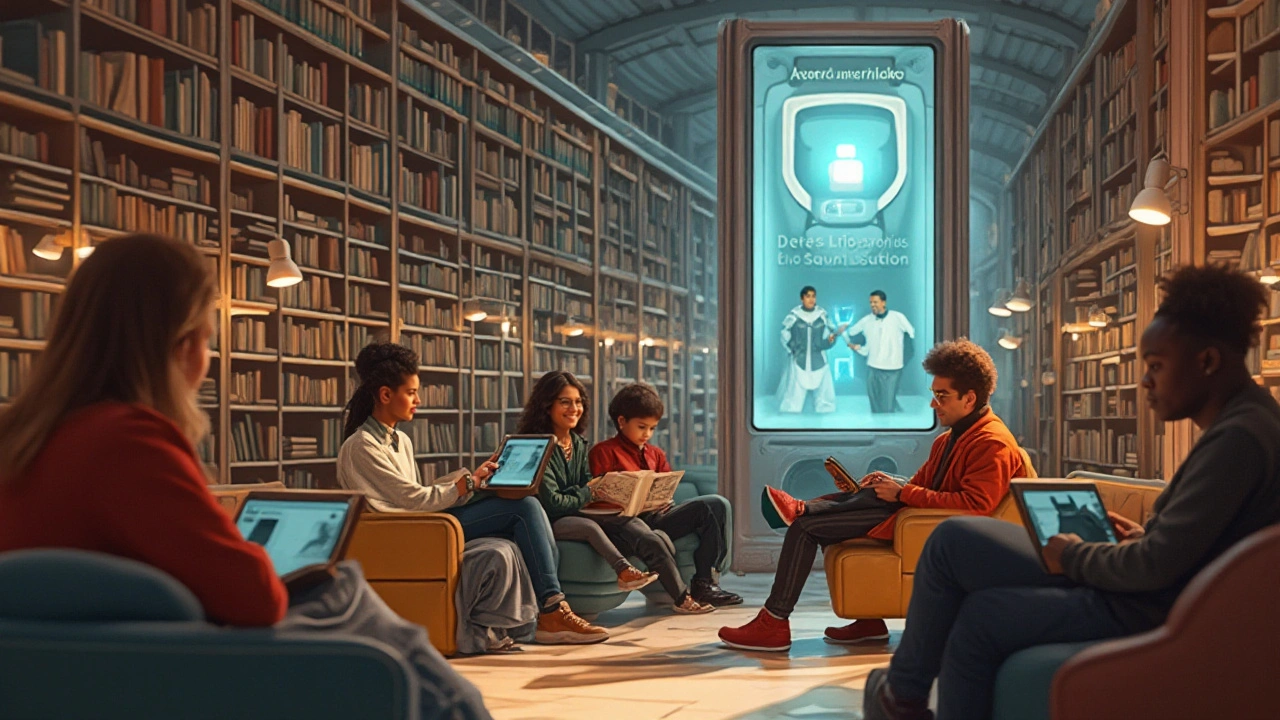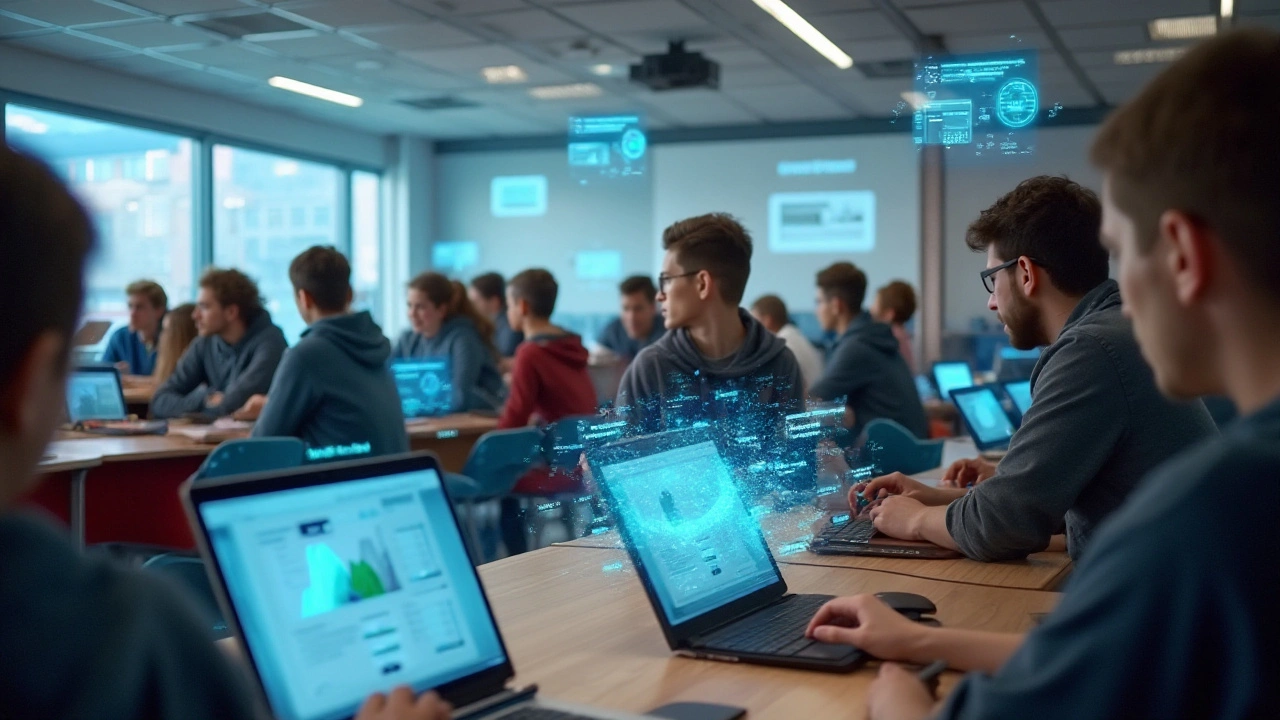The transformation of the educational landscape by artificial intelligence technologies continues to captivate educators and learners alike. From personalized learning paths to enhanced accessibility, AI is at the forefront of this educational revolution. But what exactly does AI bring to the table when it comes to e-learning?
In recent years, AI's presence in e-learning has shifted paradigms by offering tailored experiences to individual learners. Gone are the days of one-size-fits-all educational models. Today, AI helps create a learning environment that is not only efficient but also deeply engaging. This exciting intersection of technology and education is shaping the future in ways we could have only imagined before.
Personalized Learning
The concept of personalized learning has often been an aspiration for educators striving to tailor education to meet the nuanced needs of each student. However, with the infusion of AI in e-learning, this goal has become eminently practical and achievable. Through sophisticated machine learning algorithms, AI systems can assess a student's pace, comprehension, and preferred learning style, thereby offering a curriculum that adapts dynamically. These systems collect vast amounts of data and analyze it to understand a learner's habits and progress, creating an educational experience that feels uniquely crafted for the individual.
In the realm of e-learning, personalized platforms are no longer simply predicting what topics a student might be interested in, but rather understanding how each student learns best. Imagine a scenario where an AI tutor identifies when you prefer video content over text, and adjusts the curriculum accordingly. That's the future we are approaching with AI's intervention. Just as every student has unique needs, they also have unique strengths, and AI helps in emphasizing these strengths by adapting content and even the style of delivery to match personal preferences. It's as if every student has a personal tutor in the form of their e-learning platform, responding intelligently to the learner's cues.
One often-cited example is how the Khan Academy, an established educational organization, utilizes machine learning to recommend the next best lesson to students based on their current level of understanding. Forbes highlighted this aspect when they noted,
"Machine learning algorithms have proven incredibly adept at customizing educational content, removing the mystery of what comes next in a student's learning journey."This approach not only keeps students engaged but also optimally challenges them without progressing too quickly or slowly. A learner-centered approach revolutionizes how content is supplied, allowing for tracking and adjusting based on continuous feedback from the learner's interaction with the material.
Such advancements in personalized learning have great potential benefits, including increased engagement and motivation. Engaging content least resembles traditional linear lessons and instead integrates diverse types of media, interactivity, and assessments, which AI facilitates seamlessly. It brings about performance improvements and provides detailed analysis which in return lets educators understand their students' learning paths and intervene when needed. The positive impacts of such personalized learning extend beyond academics, building essential skills like self-regulation, independence, and resilience in students, which are invaluable in the fast-evolving global landscape.

Accessibility Enhancements
In today's world, making education accessible has become a key concern, and AI is playing a pivotal role in breaking barriers. One of the most profound impacts of artificial intelligence in e-learning is its ability to tailor content and delivery methods to meet the diverse needs of learners. This is particularly crucial for students with disabilities, who often face challenges with traditional learning environments. AI systems can assist by providing real-time transcription and translation services, making it possible for individuals with hearing impairments or language barriers to fully participate in learning activities. These systems are also adept at converting text into speech and vice versa, paving the way for visually impaired students to access course materials without difficulty.
One remarkable feature powered by AI is sentiment analysis, which can gauge a learner's mood based on their interactions. By identifying when a student might be frustrated or confused, the system can alter the pace of instruction or provide additional resources, which can help keep every student engaged and successful. This technology not only democratizes learning but also personalizes it, ensuring that individual needs are prioritized.
"The success of technology depends on how well it is used to meet human needs, and AI offers promising ways to reduce educational disparities," says Dr. John Poleski, a renowned expert in educational technology.
The use of smart assistants like Alexa and Google Assistant in classrooms is gaining traction. These AI-driven tools can answer queries, conduct quizzes, and even facilitate discussions, thereby providing a non-judgmental interface for students to interact with. By integrating voice control, these systems allow students with motor impairments to engage in learning without barriers, fostering an inclusive learning atmosphere.
Moreover, the evolution of virtual reality (VR) and augmented reality (AR) aided by AI is opening new worlds within education. These technologies simulate realistic environments and can depict complex concepts in a layered way, appealing to all senses and making learning an immersive experience. AI algorithms are adept at analyzing vast amounts of data from these interactions, allowing them to improve and adapt the VR and AR environments for a personalized touch.
Importantly, as AI becomes more integrated into e-learning, educational institutions are developing AI ethics courses to guide responsible use. Students are taught to be both ethical users and developers of AI, reflecting a commitment to ensuring that AI enhances rather than hinders equitable access to education. This ensures that as technology evolves, its benefits are shared broadly across all segments of society.

Efficiency and Engagement
Imagine a classroom where every student's path to understanding is tailor-made. Today, AI can do just that, reshaping e-learning by creating environments where efficiency meets learner engagement in unprecedented ways. In the context of e-learning, efficiency isn't just about speed; it's about precision and relevance. AI technologies analyze vast amounts of data—from learning patterns to behavioral cues—to customize educational content. This helps in minimizing learner frustration and focuses efforts precisely where they are needed.
Through AI algorithms, platforms sift through users' responses and interactions to present materials in an engaging manner, reducing the risk of information overload. This targeted approach not only makes learning more productive but also significantly increases engagement levels. AI-driven tools like chatbots and virtual assistants are becoming commonplace, offering on-demand tutoring and support. These tools can interpret a learner's struggle in real time and offer suggestions or alternative explanations, making the learning experience seamless and personalized.
One compelling fact is that AI can facilitate the gamification of learning experiences. By integrating elements of play into educational content, learners are motivated to engage deeply with the material. This is crucial in retaining information and developing a sustained interest in the subject. In some instances, AI can also suggest when a learner should take a break, based on their cognitive load, promoting better retention and reduced burnout.
"Our technology learns from your learning," says Jane Holmes, a leading AI educator. "And in doing so, it helps you become more engaged and efficient with each study session."Such innovations ensure students are not simply memorizing facts, but deeply understanding and engaging with their content in meaningful ways. In today's digital era, creating opportunities for active learning through AI isn't just a luxury; it's an educational imperative for maintaining student interest and ensuring academic achievement.
Moreover, data analysis by AI systems allows educators to track learner progress in minute detail. This enables instructors to offer precise inputs to improve learner outcomes. Educational institutions can leverage these insights on a broader scale to tailor their curriculum to better suit the needs of their students, directly impacting the quality of education provided. In this way, AI doesn't replace the teacher—instead, it enhances their ability to reach students, making education more effective and engaging than ever before.

Future Trends
The future of AI in e-learning holds a realm of possibilities that are as exciting as they are promising. As we forge ahead, we can anticipate a greater integration of AI that goes beyond providing just personalized learning experiences. One of the most significant trends poised to shape the next chapter of e-learning is the emergence of virtual tutors, which utilize AI algorithms to mimic human-like responses and guidance, offering a life-like tutor experience right from the comfort of one's home. These sophisticated programs are designed to assess student performance, provide feedback, and adapt the learning paths to individual needs.
The continuous improvement in AI language models has opened new doors for interactive and immersive learning. With tools capable of responding to spoken language, students engage in realistic simulations where AI plays an integral role in guiding them through complex scenarios. This trend is particularly transformative in fields requiring practical experience, such as medicine and engineering, where virtual simulations enhance training without the risk of real-world errors. Add to this, the increasing use of AI-driven analytics allows educators to gain deeper insights into student engagement and learning patterns, refining and optimizing the educational content and strategies deployed.
Interestingly, AI can also help bridge the language gap, making education more inclusive for non-native speakers. Multilingual AI models are being engineered to offer real-time translations, making it easier for students globally to access materials in their preferred language. In creating a borderless classroom, this trend ensures that knowledge knows no bounds and that education is accessible to everyone, regardless of geographic or linguistic barriers.
"The potential of AI in education extends beyond personalization. It is about creating a more equitable and dynamic learning environment for all." — Educational Technology Expert
Furthermore, we'll see more integration of gamification in e-learning platforms driven by AI's ability to curate engaging and captivating content tailored to individual progress and interests. By transforming educational content into a more game-like format, student motivation and enjoyment are enhanced, which promotes deeper learning and knowledge retention. Gamification aligns with the natural way human brains respond to incentives, making it a powerful trend shaping our educational landscape.

